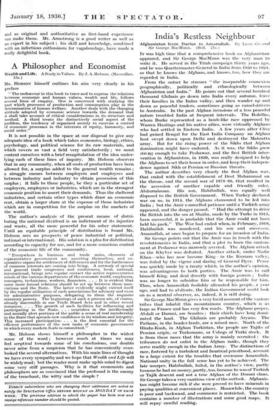A Philosopher and Economist
Wealth and Life. A Study in Values. By J. A. Hobson. (Macmillan. 15s.) MR. HOBSON himself outlines his aim very clearly in his preface " The endeavour in this book to trace and to express the relations between economic and human values, wealth and life, follows several lines of enquiry. One is concerned with studying the part which processes of production and consumption play in the determination of human welfare. Another deals with the changing attitude adopted by economic science towards the demand that it shall take account of ethical considerations in its structure and method. A third treats the distinctively social aspect of the problem, the tendency of organized society to exercise a control of economic processes in the interests of equity, humanity, and social order.'
It is not possible in the space at our disposal to give any adequate idea of a book which takes economics, biology, ethics, psychology, and political science for its raw materials, and which covers so vast a field very satisfactorily ; we must content ourselves with a brief recapitulation of the idea under- lying each of these lines of inquiry. Mr. Hobson observes that in any community, when all costs of production have been allowed for, a surplus added to the general wealth remains ; a struggle ensues between employers and employees and between industry and industry to obtain possession of this surplus ; it falls to those people, be they a particular set of employers, employees or industries, which are in the strongest economic position to assert their demands. Thus the sheltered industries, and certain other types which draw an economic rent, obtain a larger share at the expense of those industries which are in competition for the surplus on the markets of the world.
The author's analysis of the present means of distri- buting the national dividend is an indictment of its injustice and waste, all the more powerful for his sober statement. Until an equitable principle of distribution is found Mr. Hobson sees no prospects of peace industrial or political, national or international. His solution is a plea for distribution according to capacity for use, and for a more conscious control of the economic life of the community.
" Everywhere in business and trade units, elements of representative government are asserting themselves, and co- operative organs for settlement of differences and for the furtherance of- common interests are coming into being. A network of special and general trade congresses and conferences, local, national, international, brings into regular contact the active representative minds of the various departments of the economic world, employers, managers, technicians, workers, financiers. . . . It is evident that some more formal relations should be set up between these asso- ciations and the State. The latter evidently might extend itself by the regular utilization of such associations for advisory and even for administrative purposes, delegating to them the requisite statutory powers. The beginnings of such a process are, of course, already discernible in our Trade Board Acts and in other recent instances. . . . The growth of such facilities for influencing and participating in the State. . . . nourishes in the intellectually and morally alert portions of the public a sense of real membership in the State that spreads new confidence in its wisdom and integrity. This increased participation. . . . is the first essential for the efficient performance of the new tasks of economic government to which every modern State is committed."
Mr. Hobson shows himself a philosopher in the widest sense of the word ; however much at times we may feel sceptical towards some of his conclusions, our doubts never arise from a suspicion that he has conveniently over- looked the several alternatives. With his main lines of thought we have every sympathy and we hope that Wealth and Life will be widely read; but the reader must make up his mind to digest some very stiff passages. Why is it that economists and philosophers are so convinced that the profound is the enemy of the trenchant, the witty and the simple ?






































 Previous page
Previous page